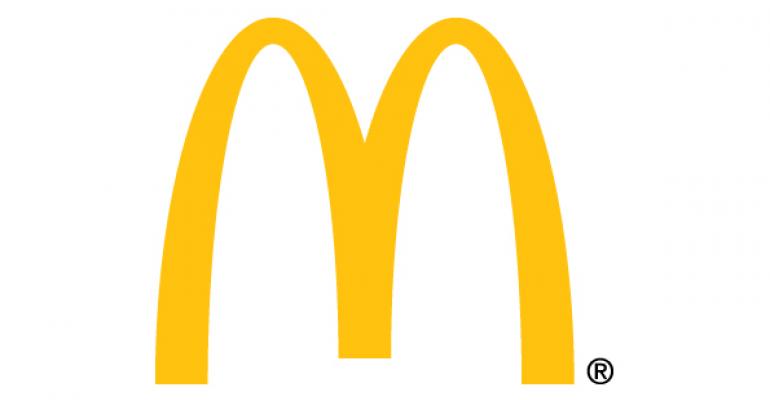McDonald’s Corp. sales have been weakening throughout the summer, and that didn’t change in September, according to Janney Capital Markets analyst Mark Kalinowski’s survey of the burger giant’s franchisees.
In the survey, published Friday, operators said their same-store sales fell 3.6 percent. That would be the worst monthly performance for the venerable quick-service chain since December’s weather-weakened 3.8-percent decline.
The survey prompted Kalinowski to reduce earnings estimates on McDonald’s ahead of the company’s quarterly financial report, scheduled to be released next Tuesday. Kalinowski reduced his full-year earnings-per-share estimate by 1 cent, to $5.30. He also lowered his fair market estimate of the company’s shares to $90, roughly where the chain’s stock has been trading.
“In one context, McDonald’s has had multiple decades of enormous success,” Kalinowski said. He rates McDonald’s as Neutral. “But that is what McDonald’s has accomplished in the past. Wall Street is about ‘what have you done for me lately,’ or perhaps more accurately, ‘what are you going to do for me in the future.’ And right now, McDonald’s faces a number of challenges on multiple fronts.”
There is one bright spot in the survey, and that is October numbers. Aided by the company’s important, annual Monopoly promotion, franchisees forecast that the month’s same-store sales number will fall by 0.7 percent in the U.S. While that is yet another decline, it’s considerably better than recent sales trends.
This is the 64th McDonald’s Franchisee Survey in which the research firm talks with 32 McDonald’s franchisees that collectively own 256 restaurants. The surveys, which are published five to six times a year, are usually more optimistic than estimates turn out to be, but they do provide a good picture of comps: The same-store sales prediction has been within 100 basis points of the actual number two-thirds of the time, and within 200 basis points on all but six surveys. On average, the difference between the survey and results is about 100 basis points.
This survey comes during what has been arguably the worst year for the burger chain in more than a decade. McDonald’s hasn’t had a monthly increase in domestic same-store sales since October of last year, and last year’s comparable store sales fell 0.2 percent.
In addition to the sales weakness, franchisees are also facing increased costs for labor, thanks to minimum wage hikes and public pressure to raise wages. Food costs are high as well. The prices for beef and cheese are stratospheric, and both of those commodities are heavily used within McDonald’s restaurants.
Add it up and you get mounting franchisee unrest. When asked for their six-month outlook, 28 of the 32 franchisees rated it “fair” or “poor,” with the others split between “very good” and “good.” None of the operators called the outlook “excellent.”
The relationship status was rated even worse, with 15 franchisees rating their relationship with the franchisor as “poor” and 12 calling it “fair.” Nobody called the relationship “excellent” and only one franchisee called it “very good.”
“We are not being creative,” one franchisee said in the survey, “just reacting to outside forces and critics.”
“Nothing positive to say about McDonald’s or its future,” said another franchisee.
Another noted, “I look forward to new leadership.”
“You’re already facing margin pressure on multiple fronts, and then same-store sales are negative,” Kalinowski said. “That makes things much more difficult.”
Operators did not have good news to report on the impact of company efforts to streamline the menu and simplify kitchen operations. When asked about those efforts, only one of the 32 franchisees that answered the question said they’re yielding results.
Franchisees, and the company, have been concerned in recent quarters about the chain’s menu, which has grown extensively after more than a decade of product additions. While those product additions have brought the company’s average unit volumes past $2.5 million—far higher than either of its main competitors, Burger King Corp. and The Wendy’s Company—franchisees say the big menu is hurting service and slowing the chain’s trademark speed.
“All I have heard is talk, no action,” one franchisee commented in the survey. Another agreed with that assessment. “They continue to add more items (and admittedly will add more) even though they talk about reducing the menu,” that franchisee said. “Top management is clueless as to what goes on in the stores.”
Simplifying the menu and improving service could be key for McDonald’s going forward, but doing so is easier said than done, Kalinowski said. That’s because simplifying the menu might cost the company sales in the short-term, and the company would get punished on Wall Street, even if that short-term loss leads to a long-term gain thanks to improved service.
“Another short-term hit isn’t necessarily going to be greeted warmly by Wall Street,” Kalinowski said. “That’s not even saying it’s the wrong thing to do. Long-term, it could be the right thing to do. You’ve just got to figure out what your priorities are here.”
Contact Jonathan Maze at [email protected].
Follow him on Twitter at @jonathanmaze





